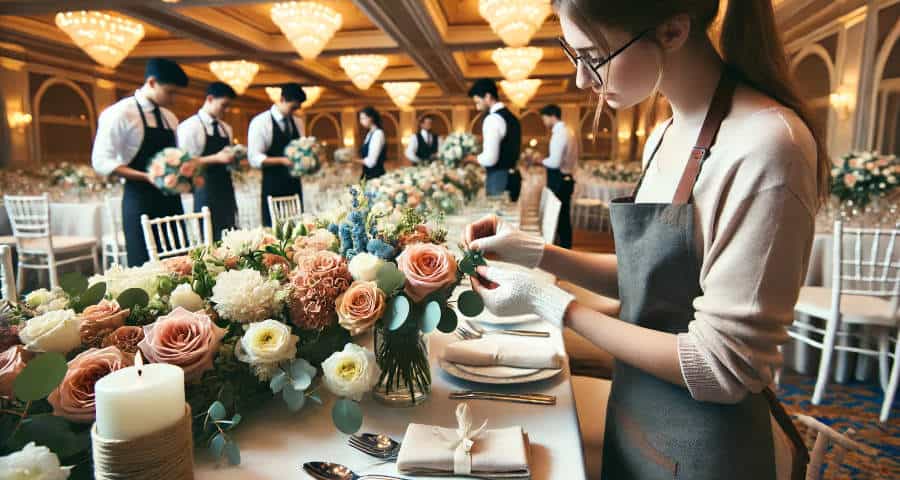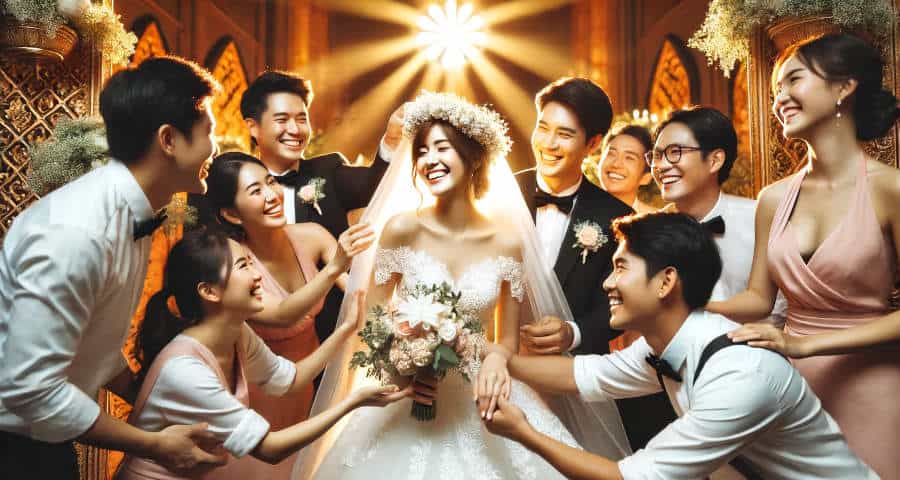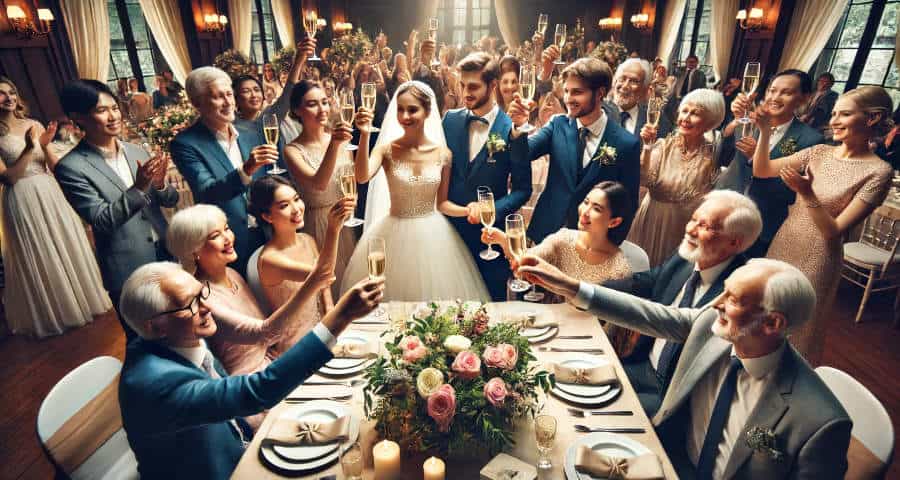On your wedding day, you are the star of the show, supported by a dedicated team of key players to ensure everything runs perfectly.
By thoughtfully recruiting trusted friends, family, and professionals, you set the stage for a celebration that unfolds seamlessly, allowing you and your guests to fully enjoy every moment.
Understanding the different roles is crucial to ensure that the right people are in the right positions to bring your vision to life.
Your Roles in the Wedding

In planning your wedding, you will take on two main roles: the Planner and the Guest of Honor.
As the Planner
Before the big day, you are in charge of organising the event. This role includes a significant amount of planning and coordination. You’ll need to set up key people in different roles to ensure the wedding day runs smoothly. This delegation helps distribute the workload, utilising the strengths and abilities of your friends and family to manage various aspects of the day effectively.
As the Person of Honor
On your wedding day, your role changes from being the planner to being the guest of honour. This change means that you should step back from managing the day-to-day details and focus on enjoying the celebration. It’s a time to celebrate your commitment and share joy with your loved ones.
The spotlight may be on you, but it doesn’t mean you should be handling everything. Rather, it’s a day to rely on the careful planning you’ve put in place. Your bridesmaids, the Master of Ceremonies (MC), or any other designated individuals are there to handle any issues that may arise, allowing you to enjoy your day without stress.
Like a performer relies on their team to manage the concert, you can trust your wedding team to take care of the logistics. This lets you focus on the significant parts of your wedding day—celebrating your love and the beginning of a new chapter in your life.
The Key Support Roles

- Maid of Honor and Best Man: These are not just titles but roles filled with responsibility. The Maid of Honor and Best Man are your right-hand individuals, tasked with significant duties such as organising pre-wedding events (bridal shower, bachelor party), assisting with wedding planning details, and providing emotional support. On the day, they may coordinate with vendors, manage the bridal party, and handle any unforeseen challenges.
- Bridesmaids and Groomsmen: Beyond standing beside you during the ceremony, bridesmaids and groomsmen contribute to the smooth running of the day. Their responsibilities can range from helping with decoration setup to directing guests to their seats, and even assisting with last-minute errands.
- Flower Girl and Ring Bearer: These roles add a touch of innocence and charm to your ceremony. The flower girl, typically a young girl aged three to eight, walks down the aisle before the bride, scattering flower petals (where venue permits) or carrying a bouquet. The ring bearer, usually a young boy of similar age, has the special task of carrying the wedding rings on a pillow down the aisle to the altar. Both roles require children who are well-behaved and comfortable with walking in front of a crowd.
- Ushers: Ushers play a crucial role in managing the flow of guests. They greet attendees, guide them to their seats, and assist with any mobility issues, ensuring everyone is comfortable and the ceremony starts on time.
- Ceremony Readers: Selecting friends or family members to read passages during your ceremony adds a personal touch and involves your loved ones in a meaningful way. Choose individuals who are comfortable speaking in front of a crowd and who share a connection with the chosen readings.
- Guest Transportation Coordinators: If your wedding involves transporting guests between locations, appointing a coordinator to manage this aspect can alleviate stress. They ensure that vehicles arrive on time, guests know where to go, and everyone gets to the ceremony and reception without any confusion.
- Guest Book Attendants: Having a dedicated person or people to encourage guests to sign your guestbook ensures you have a keepsake filled with personal messages from those who celebrated with you.
- Master of Ceremonies (MC): The MC is a pivotal figure in ensuring your reception runs smoothly. This person introduces speakers, announces events such as the first dance or cake cutting, and generally keeps the evening on schedule. An effective MC combines organisation with a sense of humour and the ability to engage guests, making them essential for maintaining the flow and energy of your celebration.
Professional Services

In addition to the key roles filled by your cherished friends and family, your wedding day also relies heavily on the expertise of paid professionals. These individuals bring a level of skill and experience that is essential for bringing your wedding vision to life and ensuring that every detail is executed flawlessly. Below are some of the professional services that play a pivotal role in the success of your wedding day:
- Wedding Planner: A wedding planner can be invaluable in taking the burden of planning and coordination off your shoulders. They oversee the logistics, manage vendors, and ensure that every aspect of your day aligns with your vision.
- Photographer and Videographer: Capturing the memories of your wedding day is crucial, and professional photographers and videographers have the expertise to document your day beautifully. They know how to catch those candid moments and create lasting memories you’ll cherish forever.
- Makeup Artist and Hairstylist: To look and feel your best, professional makeup artists and hairstylists can enhance your natural beauty with their skills. They’re experienced in creating wedding-appropriate looks that last throughout the day and night.
- Nail Technician: For that perfect manicure in your close-up ring photos, a professional nail technician can provide both the bride and bridal party with elegant and durable nail designs.
- Caterer: The reception meal is a significant part of your celebration, and a professional caterer will not only provide delicious food but also ensure the meal service runs smoothly, accommodating any dietary restrictions and preferences.
- Florist: From bouquets to table centrepieces, a professional florist will bring your floral vision to life, using their knowledge of blooms to create arrangements that complement your wedding’s theme and style.
- Wedding Celebrant/Officiant: Whether you’re having a religious or secular ceremony, your celebrant or officiant plays a crucial role in leading the exchange of vows and making your marriage official.
- DJ/Band: Music sets the tone for both your ceremony and reception. Whether you choose a DJ to play your curated playlist or a live band to add that extra level of excitement, these professionals are key to creating the atmosphere you desire.
- Cake Maker: The wedding cake is often a centrepiece of your reception. A professional cake maker can bring your vision to life, from the design to the flavours, ensuring it tastes as good as it looks.
- Transport Service/Drivers: Whether it’s getting the bridal flight to the venue on time or ensuring guests have safe transportation between locations, professional drivers and transport services play a key role in the logistics of your wedding day.
Adapting Roles to Fit Your Wedding

Every wedding is unique, and the roles within it can be adapted to suit your specific needs:
- Combining Roles: In smaller settings, some roles like Ushers and Guest Transportation Coordinators can be merged to streamline responsibilities.
- Customising Responsibilities: For less formal weddings, the Maid of Honor and Best Man might take on tasks typically handled by a wedding planner, integrating more deeply into the planning process.
- Flexibility with Professional Services: In intimate weddings, you might opt for less professional services, perhaps having a talented friend take on the photography or music, adding a personal touch to your special
Selecting the Right People

The success of your wedding day relies heavily on the people you choose to fill various roles, from the key support positions among friends and family to the professional services you hire.
Ensuring that each role is entrusted to someone who is not only capable but also enthusiastic about their responsibilities is essential.
- Identify Strengths: Evaluate the strengths and talents of your friends and family. Someone with great organisational skills might be perfect for coordinating day-of logistics, while a charismatic friend could be an ideal Master of Ceremonies (MC).
- Consider Compatibility: Choose individuals whose personalities and styles match the tone and theme of your wedding. For example, a makeup artist or photographer should understand and be able to execute your vision.
- Check Reliability: Reliability is key in roles that require significant responsibility. Consider past instances of each person’s reliability and commitment before making a decision.
- Confirm Willingness: Have an honest conversation with each potential candidate to gauge their willingness to take on the role and any other commitments they might have around your wedding date.
Communicating Expectations

After you have carefully selected individuals for each role in your wedding, the next critical step is to ensure that everyone involved has a clear understanding of what is expected of them. Effective communication is key to maintaining the organisation and flow of the wedding and ensuring that each person can perform their duties optimally.
It’s essential to communicate the responsibilities associated with each role in a clear and concise manner. This includes:
- Specific Tasks: Clearly outline the tasks each person is responsible for. For example, the guestbook attendant should know where to set up, what times they are active, and how to encourage guests to sign the book.
- Timelines: Provide a timeline detailing when each task should be completed or when they are expected to perform their role during the wedding. For instance, inform your ceremony readers about the exact timing of their readings.
- Expectations: Discuss the level of commitment and standards you expect. If you have specific expectations about how a task should be performed, communicate these details upfront. For example, explain how formal or casual you want the attire of the ushers to be.
- Written Instructions: Providing written documents can be a helpful reference, allowing those involved to review their tasks and responsibilities at their convenience.
- Rehearsals or Run-throughs: For critical roles, such as those of the Maid of Honor and Best Man, or intricate ceremonies, scheduling a rehearsal or a detailed run-through can ensure everyone understands their role in the context of the day’s events.
- Ask for Feedback: After explaining the expectations and responsibilities, ask each person if they have any questions or need clarification on any aspects of their role. This ensures they fully understand what is expected and feel supported.
Providing Support

As you delegate roles for your wedding, remember that support doesn’t end with the assignment of tasks. Providing adequate support and resources to key role players is crucial for a seamless execution of your wedding day plans.
Establish Clear Support Systems: Make clear from the outset what support systems are in place. This could include assistance from other wedding party members, access to professional vendors for specific queries, or direct support from yourselves. Knowing where help can come from is reassuring for those taking on responsibilities.
Equip Your Team: Equip your wedding party and key role players with all the information they might need. Provide lists of vendor contacts for quick communication, detailed timelines of the wedding day, or scripts for those who will be making announcements or speeches. This can significantly reduce anxiety and increase confidence in their roles.
Maintain Open Communication: Regular check-ins are invaluable for maintaining open lines of communication. These can be informal catch-ups to discuss how everyone is feeling about their tasks, answer any questions that may have arisen, and provide updates on any changes or additional information. It’s also a great way to gauge the overall mood and address any concerns early on.
Accessible Contact Points: Make sure everyone knows how to reach you or a designated wedding coordinator for urgent questions or clarifications. Having a go-to person for immediate assistance can alleviate many of the stresses associated with executing their roles, especially as the wedding day approaches.
Continuous Reassurance: Reassure everyone that you are available for guidance and support. While it’s important to trust in their abilities to carry out their roles, knowing they can reach out to you for help fosters a supportive environment that can lead to a more positive experience for all involved.
Trusting Your Team

After you’ve designated roles and set clear expectations, the crucial next step is to trust in your team. This trust shifts delegation from merely distributing tasks to empowering your friends, family, and hired professionals to actively contribute to the success of your wedding day.
Empowerment Through Trust: Trust fosters a sense of responsibility and can inspire your team to surpass expectations. When individuals feel trusted, they’re more likely to take initiative and creatively solve problems, which is invaluable for navigating the day’s inevitable surprises.
Autonomy Leads to Smooth Operations: Trusting your team allows them to handle unforeseen situations independently, minimising disruptions and reducing your need to micromanage. This autonomy ensures a smoother flow of events, enabling you to focus on the heart of the celebration—your commitment and joy.
Enhancing Communication and Support: A trusting environment improves communication and mutual support among team members, fostering unity and cooperation essential for managing last-minute adjustments or challenges. Trust is also a form of respect; it acknowledges the skills and dedication of those involved and reinforces their commitment to making your day memorable.
Stepping Back: Once expectations are set, give your team the freedom to execute their roles. This liberty encourages creativity and ownership, which are crucial for a successful event.
Maintain Open Lines for Significant Concerns: While it’s important to step back, remain approachable for significant concerns. Trust that your team will seek your guidance when truly necessary.
Focus on What Truly Matters: Minor hiccups won’t overshadow the joy and love celebrated on your wedding day. Trusting your team allows you to concentrate on what’s truly important—enjoying the beginning of your new life together.
Incorporating these principles into your wedding planning process not only helps ensure that everything runs smoothly but also contributes to a more enjoyable and memorable experience for everyone involved.
Showing Appreciation

Taking a moment to show appreciation to those who contributed to your special day is both meaningful and essential. Whether it’s the professionals who went above and beyond to bring your vision to life, or the loved ones who volunteered their time and effort, each deserves recognition for their part in making your day memorable.
- Personalized Thank You Notes: Consider writing personalised thank you notes, which are a timeless and effective way to express your gratitude. A handwritten message that highlights a person’s specific contribution can make them feel truly valued and appreciated.
- Thoughtful Gifts: Small gifts can serve as a tangible token of your appreciation. Choose something that reflects the recipient’s personality or interests, or perhaps an item that commemorates the wedding day. For volunteers, consider a framed photo of the wedding, a custom piece of jewellery, or a gift card to their favourite restaurant. For vendors, a thoughtful item along with a positive review or referral can mean a lot.
- Public Recognition During Speeches: During your wedding speeches, take the time to thank your vendors, bridal party, and any other key contributors by name. Public recognition not only highlights their efforts but also shares their contributions with all your guests.
- Strengthening Relationships: Showing appreciation not only acknowledges the hard work and dedication of those involved but also strengthens relationships and fosters a positive and supportive community around you. This circle of gratitude contributes to the joyous atmosphere of your wedding, making it a more fulfilling experience for everyone involved.
- Impact on Professional Relationships: For professionals, your appreciation and feedback can be invaluable for their future work. Positive reviews, referrals, and even repeat business are often predicated on the satisfaction of their clients. For friends and family, it reinforces the value of their support and can deepen your bond with them.
By ensuring that everyone who contributed feels appreciated, you enhance the shared joy and collective memory of your wedding day, creating lasting bonds and positive experiences that extend beyond the event itself.

